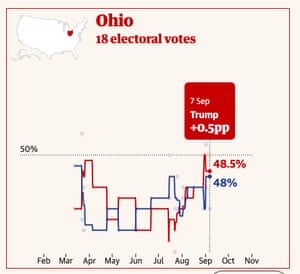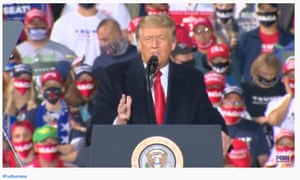Hello and welcome to today’s live coverage of the coronavirus pandemic.
My name is Helen Sullivan and I’ll be bringing you the latest updates for the next few hours. We love to hear from you – get in touch on Twitter @helenrsullivan or via email: helen.sullivan@theguardian.com.
Pubs, bars and restaurants in England will have to shut by 10pm from Thursday under new nationwide restrictions to halt an “exponential” rise in coronavirus cases.
Boris Johnson is expected to make an address to the nation on Tuesday setting out the new measures. With cases doubling every week across the UK and a second wave expected to last up to six months, health officials had advised the government over the weekend to “move hard and fast”, according to a source.
There could be up to 50,000 new coronavirus cases per day in Britain by the middle of October if the pandemic continues at its current pace, the country’s chief scientist adviser warned. On Sunday, health minister Matt Hancock said a second national lockdown was possible.
- The US is nearing 200,000 coronavirus, the highest toll in the world. There are currently 199,756 deaths registered on the Johns Hopkins University tracker. The US has 6.8m cases. Worldwide, there are 31,180,434 cases and 962,232 deaths.
- Shares in London have had their worst losses in more than three months amid fears that a second wave of coronavirus cases will force the government into harsh lockdown measures that will damage the economy. The FTSE 100 – the leading benchmark of the UK stock market – closed more than 200 points down at 5,804 points on a day of sharp falls in equities in both Europe and North America.
- London mayor to propose new Covid-19 restrictions for capital. Sadiq Khan, the mayor of London, said he has agreed with local council leaders and public health experts a plan to put to the central government for new Covid-19 restrictions to stem the spread of the virus in the capital. “We will collectively be asking the government to implement this plan as soon as possible and I will be discussing it with the prime minister tomorrow morning,” Khan said in a statement.
- A total of 156 countries have joined the global Covax scheme intended to ensure fair distribution of supplies of future vaccines against Covid-19, an alliance led by the World Health Organization (WHO) said on Monday. The list includes 64 wealthier, self-financing countries, and accounts for about two-thirds of the global population, a statement issued by the WHO and GAVI vaccine alliance said, after a deadline of last Friday to make binding commitments.
- The number of coronavirus infections in Iran has risen by 3,341 in the past 24 hours, the highest daily tally since early June, taking total cases to 425,481, the health ministry spokeswoman told state TV on Monday.
- The Czech prime minister, Andrej Babiš, nominated a top epidemiologist to become health minister on Monday after the previous minister quit over a sharp rise in Covid-19 infections. Roman Prymula, who helped lead the central European country’s response to the initial coronavirus outbreak in March, will replace Adam Vojtěch, who quit on Monday after criticism over the surge in new cases following an easing of restrictions.
- The head of an influential group in the UK parliament has signalled that the government could face resistance from its own party if ministers once again introduce new lockdown measures without proper legislative scrutiny. Sir Graham Brady, the chairman of the 1922 Committee, a powerful group of Conservative party backbench MPs, said ministers had “got into the habit of ruling by decree”, adding: “The British people are not used to being treated like children.”
- The Taj Mahal will reopen after a six-month closure. There will be some restrictions such as compulsory mask-wearing, thermal screening of visitors and physical distancing at the monument












